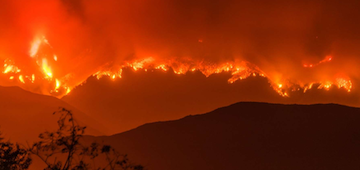It feels like we are at a catastrophic turning point with regard to climate change but the panic has, as of late caught on, mostly because the Global North is starting to see the ill effects of global warming first hand. Even then the response from developed countries has been extremely disappointing. Exploitation of the Global South continues unabated. Ideas like climate-focused assistance and reparations are laughed at.
In this speech, Thomas Sankara talks about the continued desertification of the Sahel, the proud Burkina Faso traditions that highlight the importance of aforestation and how ultimately capitalism and imperialism stand in the way of achieving harmany between civilisation and nature.
Some interesting excerpts:
My Homeland, Burkina Faso, is without question one of the rare countries on this planet justified in calling itself and viewing itself as a distillation of all the natural evils from which mankind still suffers at the end of this twentieth century.
Eight million Burkinabè have painfully internalized this reality for twenty-three years. They have watched their mothers, fathers, daughters, and sons die, with hunger, famine, disease, and ignorance decimating them by the hundreds. With tears in their eyes, they have watched ponds and rivers dry up. Since 1973 they have seen the environment deteriorate, trees die, and the desert invade with giant strides. It is estimated that the desert in the Sahel advances at the rate of seven kilometers per year.
Here I am merely the humble spokesperson of a people who, having passively watched their natural environment die, refuse to watch themselves die. Since August 4, 1983, water, trees, and lives, if not by survival itself, have been fundamental and sacred elements in all actions taken by the National Council of the Revolution, which leads Burkina Faso.
For nearly three years now, my people, the Burkinabè people, have been fighting a battle against the encroachment of the desert. So it was their duty to be here on this platform to talk about their experience, and also to benefit from the experience of other people from around the world. For nearly three years in Burkina Faso, every happy event, marriages, baptisms, award presentations, and visits by prominent individuals and others, is celebrated with a tree-planting ceremony.
To greet the new year 1986, all the schoolchildren and students of our capital, Ouagadougou, built more than 3,500 improved cookstoves with their own hands, offering them to their mothers. This was in addition to the 80,000 cookstoves made by the women themselves over the course of two years. This was their contribution to the national effort to reduce the consumption of firewood and to protect trees and life.
The ability to buy or simply rent one of the hundreds of the public dwellings built since August 4, 1983, is strictly conditional on the beneficiary promising to plant a minimum number of trees and to nurture them like the apple of his eye. Those who received these dwellings but were mindless of their commitment have already been evicted, thanks to the vigilance of our Committees for the Defense of the Revolution, committees that poisonous touches take pleasure in systematically and unilaterally denigrating.
After having vaccinated throughout the national territory, 2.5 million children between the ages of nine months and fourteen years, children from Burkina Faso and from neighboring countries, against measles, meningitis, and yellow fever; after having sunk more than 150 wells assuring drinking water to the 20 or so districts in our capital that lacked this vital necessity until now; after having raised the literacy rate from 12 to 22 percent in two years, the Burkinabè people victoriously continue their struggle for a green Burkina.
Ten million trees were planted under the auspices of a fifteen-month People’s Development Program, our first venture while awaiting the five-year plan. In the villages and in the developed River valleys, families must each plant one hundred trees per year.
The cutting and selling of firewood has been completely reorganized and is now strictly regulated. These measures range from the requirement to hold a lumber merchant’s card, through respecting the zones designated for wood cutting, to the requirement to ensure reforestation of deforestation areas. Today every Burkinabè town and village owns a wood grove, thus reviving an ancestral tradition.
That is why Burkina has proposed and continues to propose that at least 1 percent of the colossal sums of money sacrificed to the search for cohabitation with other stars and planets be used, by way of compensation, to finance projects to save trees and lives. We have not abandoned hope that a dialog with the Martians might lead to the re-conquest of Eden. But in the meantime, earthlings that we are, we also gave the right to reject a choice limited simply to the alternatives of hell or purgatory.
Explained in this way, our struggle for the trees and Forests is first and foremost a democratic and popular struggle. Because a handful of forestry engineers and experts getting themselves all worked up in a sterile and costly manner will never accomplish anything! Nor can the worked-up consciences of a multitude of forums and institutions, sincere and praiseworthy they may be, make the Sahel green again, when we lack the funds to drill wells for drinking water a hundred meters deep, while money abounds to build oil wells three thousand meters deep!
it’s needed another sankara



